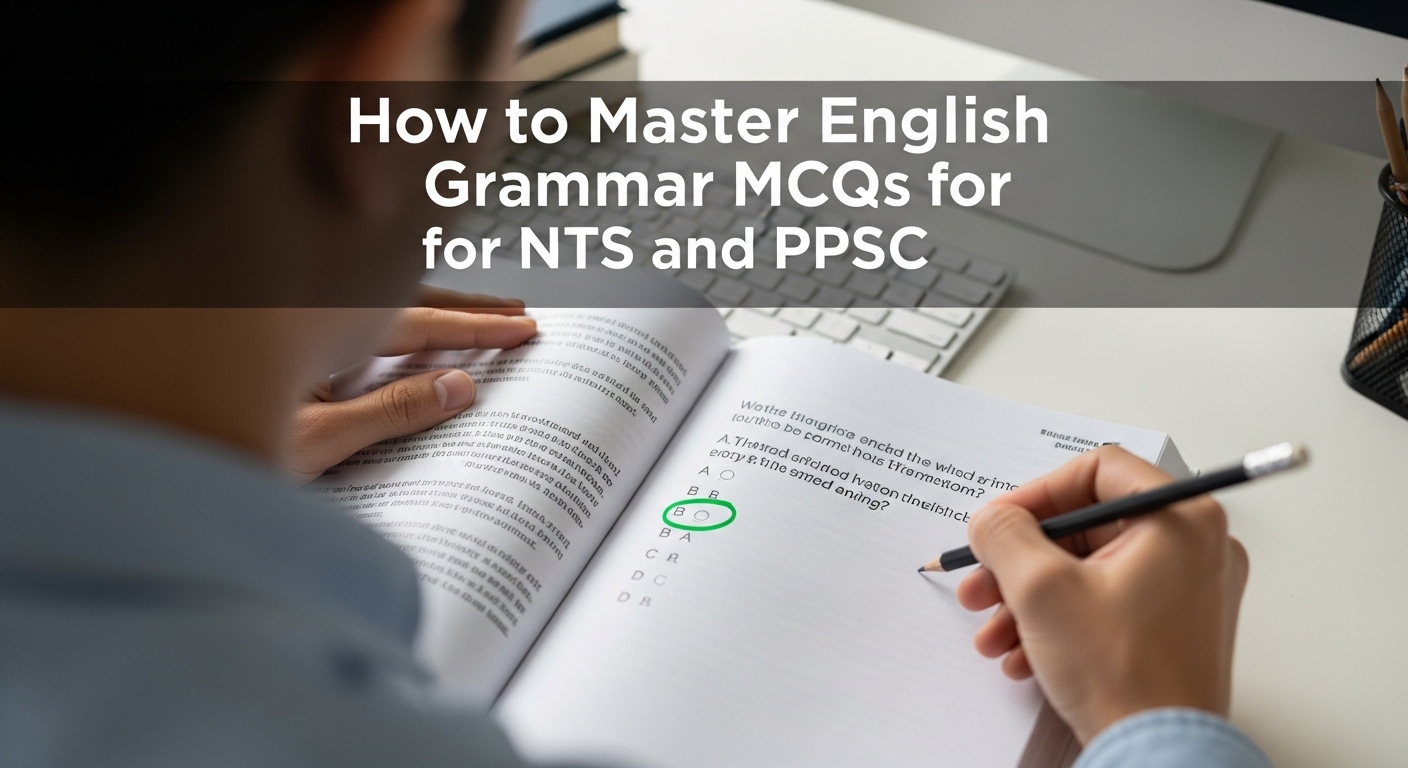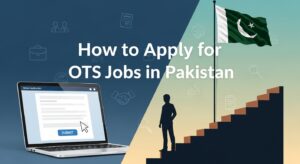English Grammar MCQs for NTS and PPSC preparation requires systematic practice and comprehensive understanding of fundamental grammar concepts. Competitive exams in Pakistan, particularly those conducted by the National Testing Service (NTS) and Punjab Public Service Commission (PPSC), heavily emphasize English language proficiency through multiple-choice questions that test candidates’ grammatical knowledge.
Success in these examinations depends largely on mastering various grammar topics that frequently appear in test papers. Understanding the question patterns, common grammar rules, and effective preparation strategies can significantly improve your performance and boost your confidence during the actual exam.
Why English Grammar MCQs Matter in Competitive Exams
English Grammar MCQs for NTS and PPSC constitute a substantial portion of the total marks in most competitive examinations. These questions assess your ability to identify correct sentence structures, appropriate word usage, and proper application of grammatical rules under time pressure.
Most candidates struggle with grammar MCQs because they require both theoretical knowledge and practical application skills. The questions are designed to test your understanding of complex grammatical concepts through carefully crafted options that often include common errors and misconceptions.
Key Benefits of Mastering Grammar MCQs
Developing proficiency in grammar MCQs offers several advantages beyond exam success. Strong grammatical knowledge enhances your overall communication skills, improves your writing abilities, and increases your confidence in professional settings.
Regular practice with NTS English preparation materials helps you recognize question patterns and develop effective elimination strategies. This systematic approach reduces exam anxiety and improves your ability to identify correct answers even when you’re uncertain about specific rules.
Topics for English Grammar MCQs
Parts of Speech and Their Applications
Understanding parts of speech forms the foundation for answering complex grammar questions. Questions related to nouns, pronouns, verbs, adjectives, adverbs, prepositions, conjunctions, and interjections appear frequently in both NTS and PPSC examinations.
PPSC English grammar questions often focus on identifying the correct part of speech in given sentences or selecting appropriate words to complete sentences. Mastering these concepts requires understanding how different parts of speech function within sentence structures and their relationships with other grammatical elements.
Part of Speech | Common Question Types | Example Topics |
Nouns | Singular/Plural forms, Countable/Uncountable | Gender, Number, Case |
Pronouns | Personal, Possessive, Demonstrative | Agreement, Reference |
Verbs | Tenses, Voice, Mood | Auxiliary verbs, Modals |
Adjectives | Degrees of comparison | Descriptive, Quantitative |
Tenses and Their Correct Usage
Tense-related questions constitute a major portion of Grammar MCQs practice test papers. These questions test your ability to identify correct tense forms, understand temporal relationships, and recognize appropriate tense usage in different contexts.
Present tense variations, including simple present, present continuous, present perfect, and present perfect continuous, require careful attention to time indicators and contextual clues. Past and future tenses follow similar patterns but include additional complexity through their various forms and applications.
Sentence Structure and Syntax
Complex sentence structures challenge candidates to demonstrate their understanding of grammatical relationships between different sentence elements. Questions may involve identifying subject-verb agreement errors, proper clause construction, or appropriate punctuation usage.
Understanding how dependent and independent clauses work together helps you answer questions about compound and complex sentences. Competitive exam English preparation should include extensive practice with sentence transformation exercises and error identification tasks.
Advanced Grammar Concepts for Higher Scores
Voice and Narration Changes
Active and passive voice transformations frequently appear in competitive examinations. These questions require understanding how to change sentence structure while maintaining the original meaning and ensuring grammatical accuracy.
Direct and indirect narration questions test your ability to convert quoted speech into reported speech and vice versa. These transformations involve changes in pronouns, tense forms, time expressions, and reporting verbs.
Conditional Sentences and Subjunctive Mood
Conditional sentences present complex grammatical structures that combine different tense forms to express hypothetical situations, possibilities, and consequences. Understanding zero, first, second, and third conditional patterns is essential for answering related MCQs correctly.
The subjunctive mood, though less common in everyday English, appears in formal writing and specific grammatical constructions. Recognizing subjunctive usage in English Grammar MCQs for NTS and PPSC requires understanding its application in wishes, suggestions, and hypothetical statements.
Effective Preparation Strategies
Creating a Study Schedule
Systematic preparation requires organizing your study time effectively across different grammar topics. Allocate more time to areas where you feel less confident while maintaining regular review of familiar concepts.
Daily practice sessions should include a mix of new topics and revision of previously covered material. Consistency in preparation helps reinforce grammatical rules and improves your ability to recall information during examinations.
Using Practice Tests and Mock Exams for English Grammar MCQs
Regular practice with NTS English preparation materials helps you familiarize yourself with question formats and time constraints. Mock examinations simulate actual testing conditions and help identify areas requiring additional attention.
Analyzing your performance in practice tests reveals patterns in your mistakes and highlights specific grammar topics that need more focus. This targeted approach makes your preparation more efficient and effective.
Common Mistakes to Avoid
Misunderstanding Question Requirements
Many candidates lose marks by misinterpreting what the question is asking. Carefully reading each question and all available options before selecting your answer can prevent unnecessary errors.
Some questions may ask for the incorrect option rather than the correct one. Paying attention to question wording, including negative forms and specific instructions, ensures you provide the expected response.
Overthinking Simple Questions
PPSC English grammar questions sometimes include straightforward concepts that candidates overcomplicate. Trust your initial understanding of basic grammatical rules rather than second-guessing yourself unnecessarily.
Time management becomes crucial when you spend too much time on individual questions. Develop the confidence to move forward when you’ve identified what you believe is the correct answer.
Technology and Online Resources
Modern preparation methods incorporate digital tools and online platforms that provide interactive learning experiences. Educational websites like Khan Academy and Grammarly Blog offer comprehensive grammar lessons and practice exercises.
Mobile applications designed for Grammar MCQs practice test preparation allow you to practice during commute time and other brief periods throughout your day. These tools often include progress tracking features that help monitor your improvement over time.
Recommended Study Materials
High-quality grammar books specifically designed for competitive examinations provide structured content and extensive practice opportunities. Authors like Wren and Martin, Raymond Murphy, and Michael Swan offer comprehensive coverage of English grammar topics relevant to Pakistani competitive exams.
Online forums and study groups connect you with other candidates preparing for similar examinations. Sharing experiences, discussing difficult concepts, and learning from others’ strategies can enhance your overall preparation effectiveness.
Building Confidence for Exam Day
Mental Preparation and Stress Management
Competitive exam English preparation extends beyond academic knowledge to include psychological readiness. Developing effective stress management techniques and maintaining a positive mindset contributes significantly to exam performance.
Regular meditation, physical exercise, and adequate sleep support cognitive function and memory retention. These lifestyle factors become particularly important during intensive preparation periods and immediately before examinations.
Final Strategies for Mastering English Grammar MCQs
The weeks leading up to your examination should focus on consolidating your knowledge rather than learning new concepts. Create summary notes of key grammatical rules and frequently review common question patterns.
Practice time management through timed mock tests that simulate actual exam conditions. This preparation helps you develop appropriate pacing strategies and reduces anxiety about completing the test within the allocated time frame.
Conclusion
Mastering English Grammar MCQs for NTS and PPSC requires dedicated preparation, consistent practice, and strategic approach to learning. Understanding fundamental grammatical concepts, recognizing common question patterns, and developing effective test-taking strategies significantly improve your chances of success in competitive examinations.
Regular practice with diverse question types builds confidence and familiarity with exam formats. Combined with systematic study schedules and appropriate use of available resources, this comprehensive preparation approach helps candidates achieve their desired scores and advance their professional careers.
Remember that grammar proficiency extends beyond exam success to enhance your overall communication abilities and professional opportunities. The time and effort invested in mastering these concepts will benefit you throughout your career and personal development journey.









